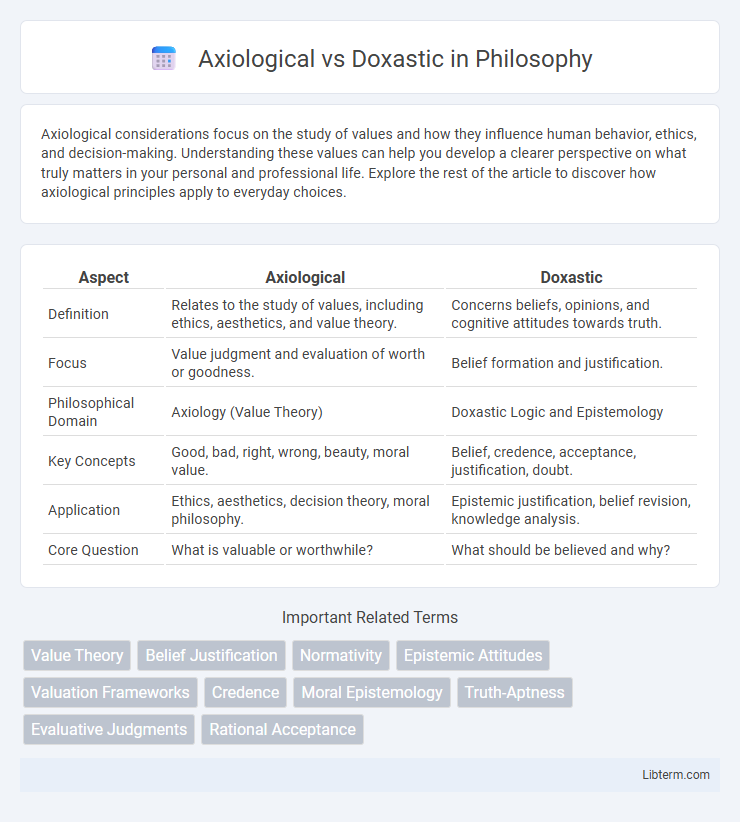Axiological considerations focus on the study of values and how they influence human behavior, ethics, and decision-making. Understanding these values can help you develop a clearer perspective on what truly matters in your personal and professional life. Explore the rest of the article to discover how axiological principles apply to everyday choices.
Table of Comparison
| Aspect | Axiological | Doxastic |
|---|---|---|
| Definition | Relates to the study of values, including ethics, aesthetics, and value theory. | Concerns beliefs, opinions, and cognitive attitudes towards truth. |
| Focus | Value judgment and evaluation of worth or goodness. | Belief formation and justification. |
| Philosophical Domain | Axiology (Value Theory) | Doxastic Logic and Epistemology |
| Key Concepts | Good, bad, right, wrong, beauty, moral value. | Belief, credence, acceptance, justification, doubt. |
| Application | Ethics, aesthetics, decision theory, moral philosophy. | Epistemic justification, belief revision, knowledge analysis. |
| Core Question | What is valuable or worthwhile? | What should be believed and why? |
Defining Axiological and Doxastic Concepts
Axiological concepts pertain to the study of values, exploring what is considered good, desirable, or valuable in ethics, aesthetics, and cultural norms. Doxastic concepts relate to beliefs and the mental attitudes individuals hold toward propositions, focusing on the acceptance or rejection of statements as true or false. Understanding these distinctions clarifies how values influence judgments differently from belief systems in philosophical analysis.
Historical Origins of Axiological and Doxastic Theories
Axiological theories, rooted in ancient Greek philosophy, emerged from the study of values and ethics, with pioneers like Plato and Aristotle exploring the nature of goodness and moral worth. Doxastic theories originated primarily in epistemology, focusing on belief systems and justification, tracing back to early Stoics and later refined by medieval scholastics such as Thomas Aquinas. The historical divergence highlights axiological concerns with value judgments while doxastic frameworks center on belief formation and truth conditions.
Key Differences: Value vs. Belief
Axiological concepts center on value judgments and the assessment of worth or goodness, while doxastic concepts focus on belief states and the acceptance of propositions as true. The key difference lies in axiological evaluations influencing ethical and aesthetic appreciation, contrasting with doxastic commitments that guide reasoning and knowledge acquisition. This distinction highlights how axiology addresses what is valuable, whereas doxastics concern what is believed.
The Role of Axiology in Ethics and Philosophy
Axiology, the study of values and value judgments, plays a crucial role in ethics and philosophy by examining what is deemed good, valuable, or worthwhile, thereby shaping moral principles and guiding ethical decision-making. Unlike doxastic concepts, which concern beliefs and the justification of knowledge, axiology focuses on the qualitative aspects of human experience such as virtues, happiness, and moral duties. This emphasis on value theory helps philosophers develop normative frameworks that influence theories of right and wrong, ultimately informing practical ethics and human behavior.
Doxastic Perspectives: Belief Formation and Justification
Doxastic perspectives center on the formation and justification of beliefs, emphasizing the mental states and processes that lead individuals to accept propositions as true. Key concepts include doxastic justification, which assesses whether a belief is supported by adequate evidence or reasons, and the distinction between epistemic justification and mere belief attribution. Understanding belief formation through doxastic lenses involves analyzing the reliability of cognitive faculties and the coherence of belief systems within epistemology.
Interactions Between Axiological and Doxastic Approaches
Axiological approaches emphasize the role of values and ethics in shaping beliefs, while doxastic approaches focus on the nature and structure of belief itself. Interactions between these frameworks reveal how value-laden preferences influence belief formation, evaluation, and revision processes. Understanding this dynamic interplay enhances models of rational decision-making by integrating ethical considerations into doxastic logic and epistemic justification.
Applications in Epistemology and Moral Philosophy
Axiological approaches in epistemology emphasize the value or worth of knowledge, shaping theories about justification and epistemic virtues like truth, wisdom, and understanding. Doxastic perspectives center on beliefs and their statuses, analyzing how beliefs are held, revised, and justified within epistemic frameworks. In moral philosophy, axiological concerns address the value of moral principles and outcomes, while doxastic considerations focus on the rationality and justification of moral beliefs and attitudes.
Common Misconceptions About Axiological and Doxastic
Common misconceptions about axiological and doxastic concepts often confuse values with beliefs, where axiological pertains strictly to value theory and ethics, while doxastic relates to beliefs and knowledge states. Many mistakenly assume axiological judgments are inherently subjective, ignoring that some value claims can be objectively analyzed within ethical frameworks. Similarly, doxastic states are sometimes oversimplified as mere opinions, discounting their structured basis in epistemology and justification processes.
Contemporary Debates and Issues
Contemporary debates on axiological versus doxastic perspectives emphasize the distinction between value-based justification and belief-based justification, stressing how normative theories address rationality and evidence differently. Axiological approaches prioritize the intrinsic worth of beliefs and aim to evaluate them through ethical or epistemic values, while doxastic frameworks focus on belief formation processes tied to evidence and truth-conduciveness. This ongoing discourse challenges traditional epistemology by exploring how values influence epistemic justification and the admissibility of evidence in belief systems.
Future Directions for Axiological and Doxastic Studies
Future directions for axiological and doxastic studies emphasize integrating value theory with belief formation processes to better understand decision-making under uncertainty. Research increasingly explores the neural correlates of value judgments and belief systems, aiming to bridge cognitive science with philosophical analysis. Advances in artificial intelligence also drive the development of models simulating axiological evaluations and doxastic reasoning to enhance human-computer interaction.
Axiological Infographic

 libterm.com
libterm.com